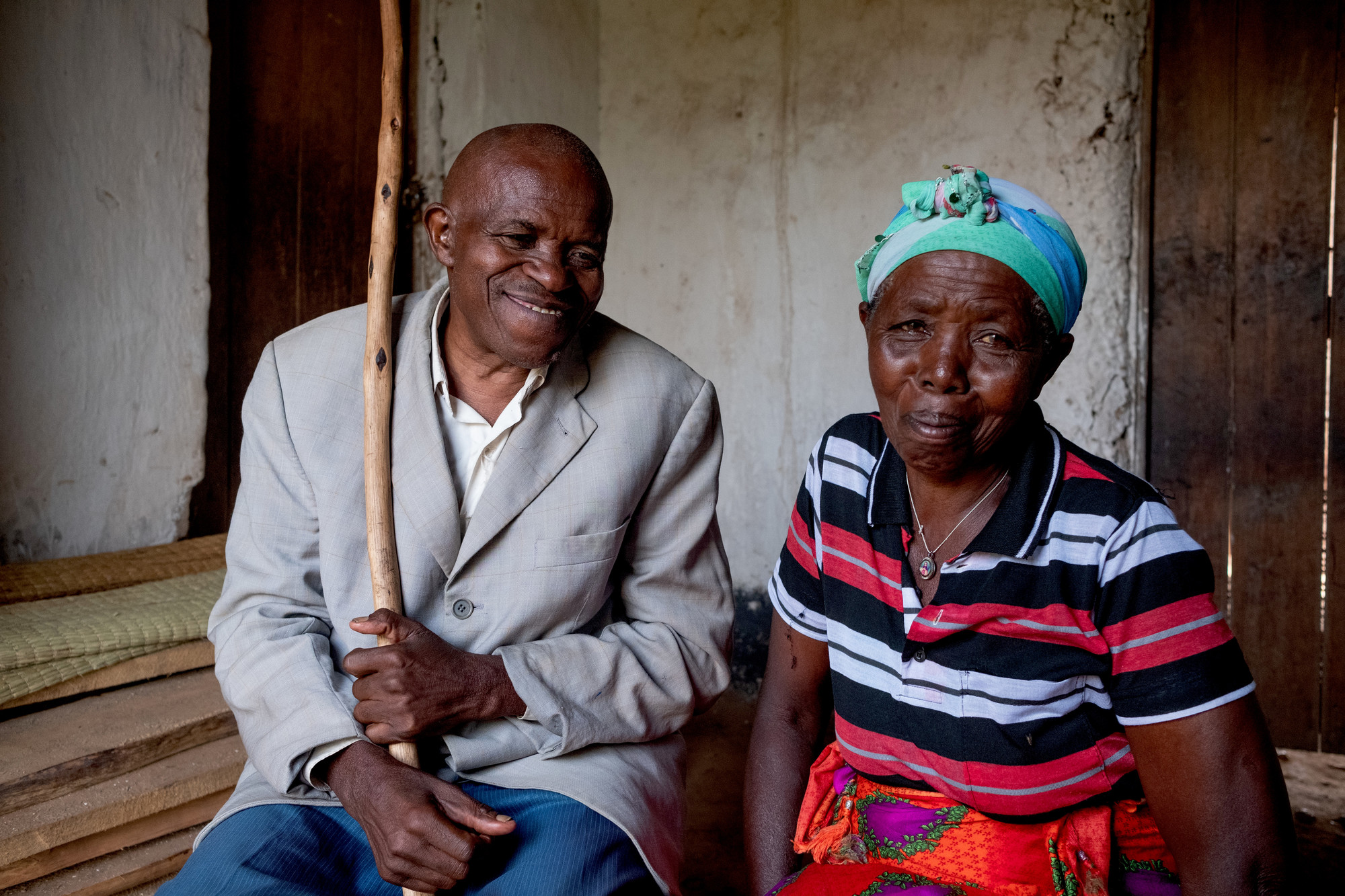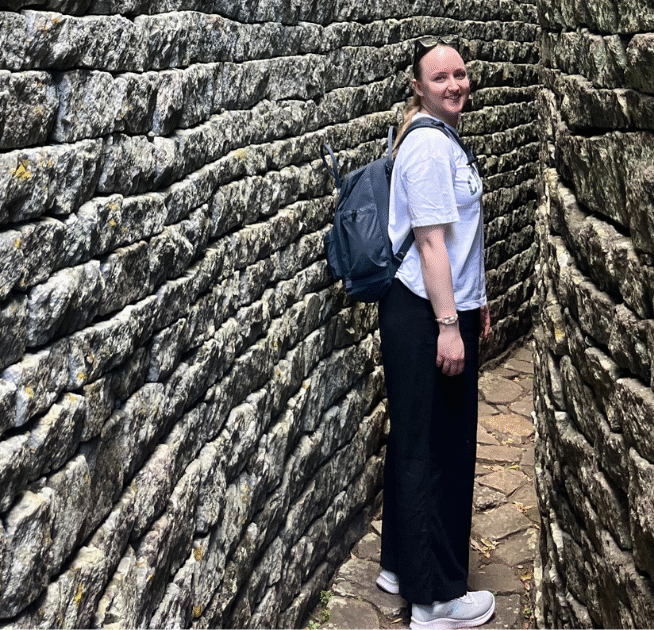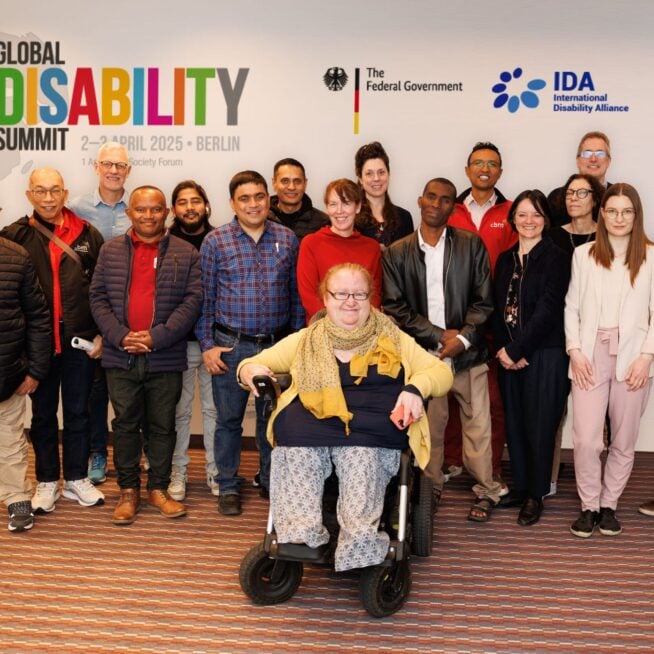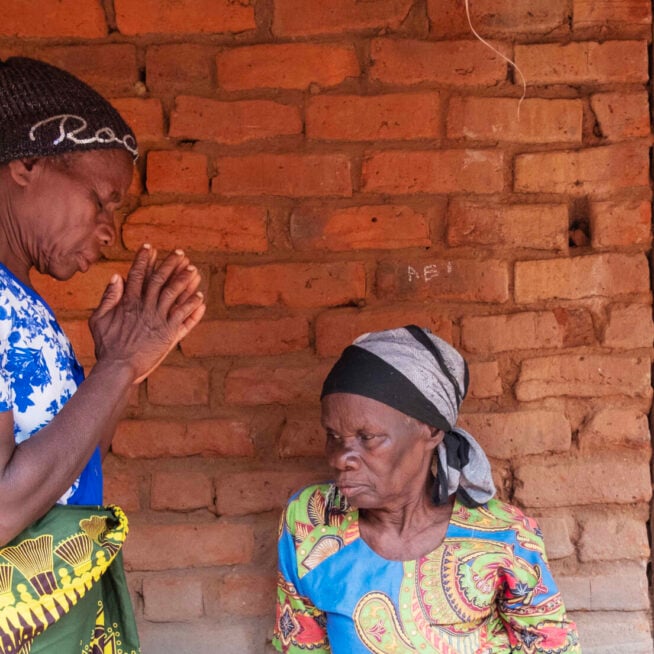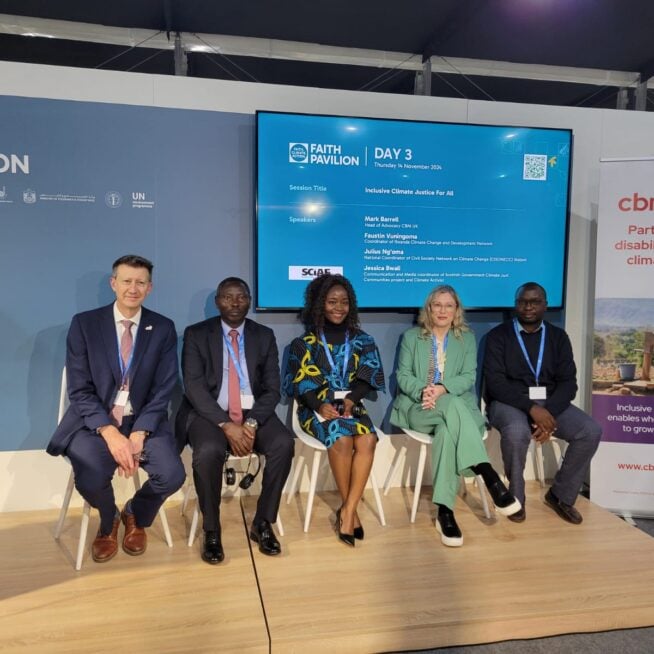Want to transform lives with us? Stay in touch and hear about our news, activities and appeals by email!
Living in rural Rwanda: sight-saving treatment out of reach

CBM UK Communications Officer, Kate Mortimer, recently visited Jean-Baptiste and his family at their home in Rwanda. In this blog, she talks about the huge barriers Jean-Baptiste has faced in trying to get treatment to restore his sight.
Jean-Baptiste’s story
The journey
We drove west from Kabgayi on tarmac roads for an hour – the further west we drove, the bigger the hills became and the weather started to turn, clouds rolling in overhead and darkening the sky. There were banana trees as far as the eye could see, more densely populated than in the South.
We turn onto a narrow, dirt track and bump along, flying out of our seats as the car struggles to climb up the steep and uneven track. After about half an hour, we arrive at a small, rural village. As we get out of the car, the heavens suddenly open and we pull on our rain coats as we run for cover under the roofs of nearby houses.
We still have an hour’s hike ahead of us to reach Jean-Baptiste’s home and decide to wait a little while to see if the rain stops. But it persists. A lady from the village kindly lets us take shelter in her home, so we all bundle in and sit on wooden benches or building blocks piled up on the floor. Local children gather in the doorway and peer through the window and we pull silly faces to make them laugh. Jean-Baptiste’s son, Leonard, turns up to meet us, with umbrellas he has borrowed from people in the village.
So, we set off on our journey in the rain, following Leonard down the hillside on a narrow, muddy path. We slip our way along cautiously, our feet squelching in the mud. As we reach the foot of the next hill, we begin pulling ourselves up the path using tree branches and foliage because it’s so steep. We say to each other ‘Can you imagine doing this journey blind?’
Jean-Baptiste’s home
The rain subsides and the sun pokes holes through the clouds as we finally reach Jean-Baptiste’s home. We weave along the path and duck under wet banana tree leaves before coming to a clearing. The view of the surrounding hills is breath-taking.
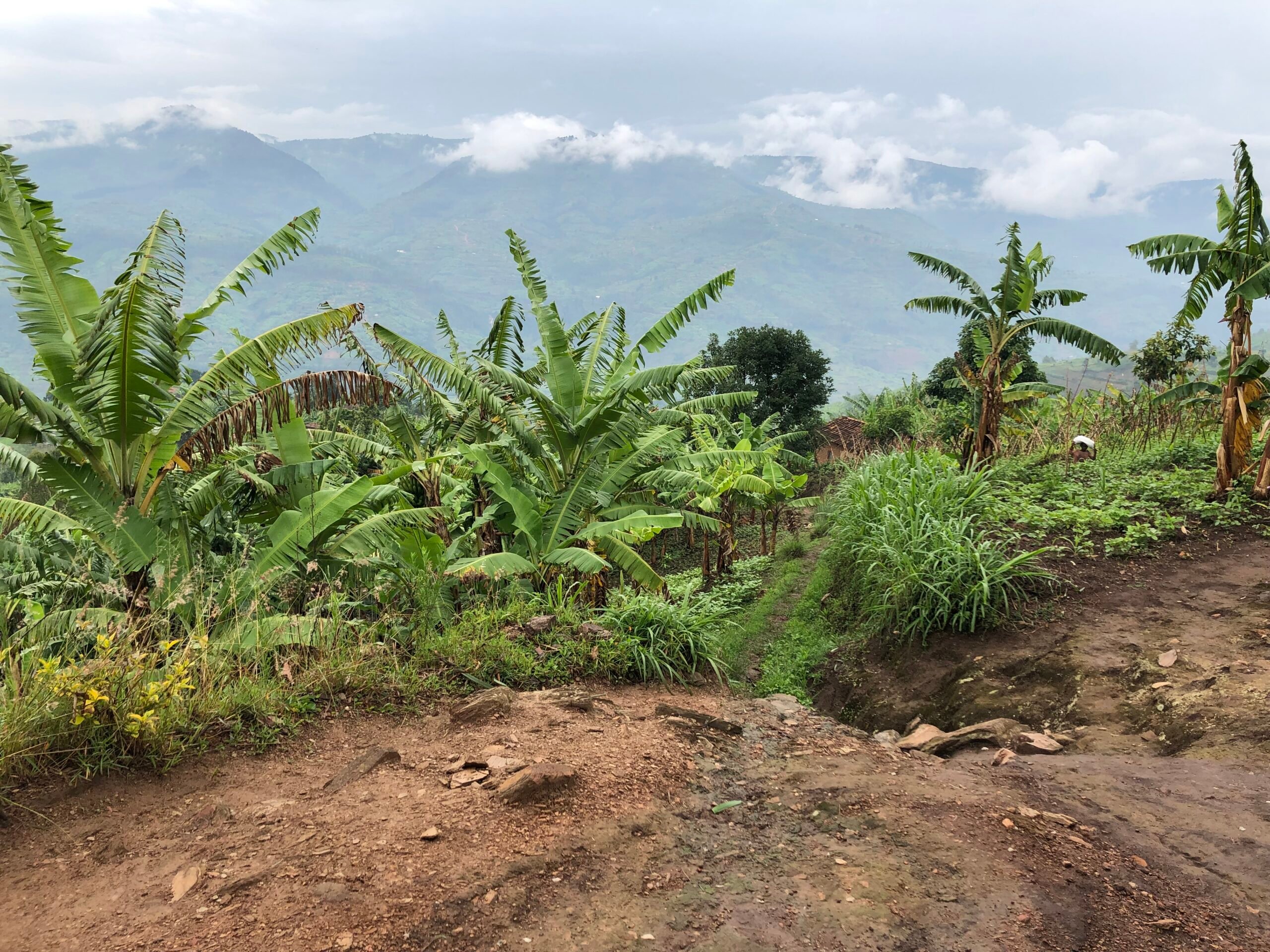
As we approach Jean-Baptiste’s mud-brick house, the first thing we can see and hear is a cow and her calf mooing from their wooden shelter. We walk along the uneven ground to reach the front door and are welcomed inside by Jean-Baptiste’s wife, Thacienne, and daughter, Florence, who live with him. They are full of energy and excitement that someone wants to hear their story. They gesture for us to sit down on a wooden bench and then guide Jean-Baptiste into the room, holding his arm to steady him.
Jean-Baptiste is immediately warm and welcoming. He uses a wooden walking stick to feel his way around the room and sits down beside us on the bench. He eagerly shakes hands with each of us, beaming as he thanks us for visiting him. He listens patiently as we speak to him and the interpreter translates everything into Kinyarwanda and then becomes animated as he begins to tell us about his experience of living with blindness.
Living with blindness
In 2017, Jean-Baptiste started losing his sight and by May 2018, he had become completely blind.
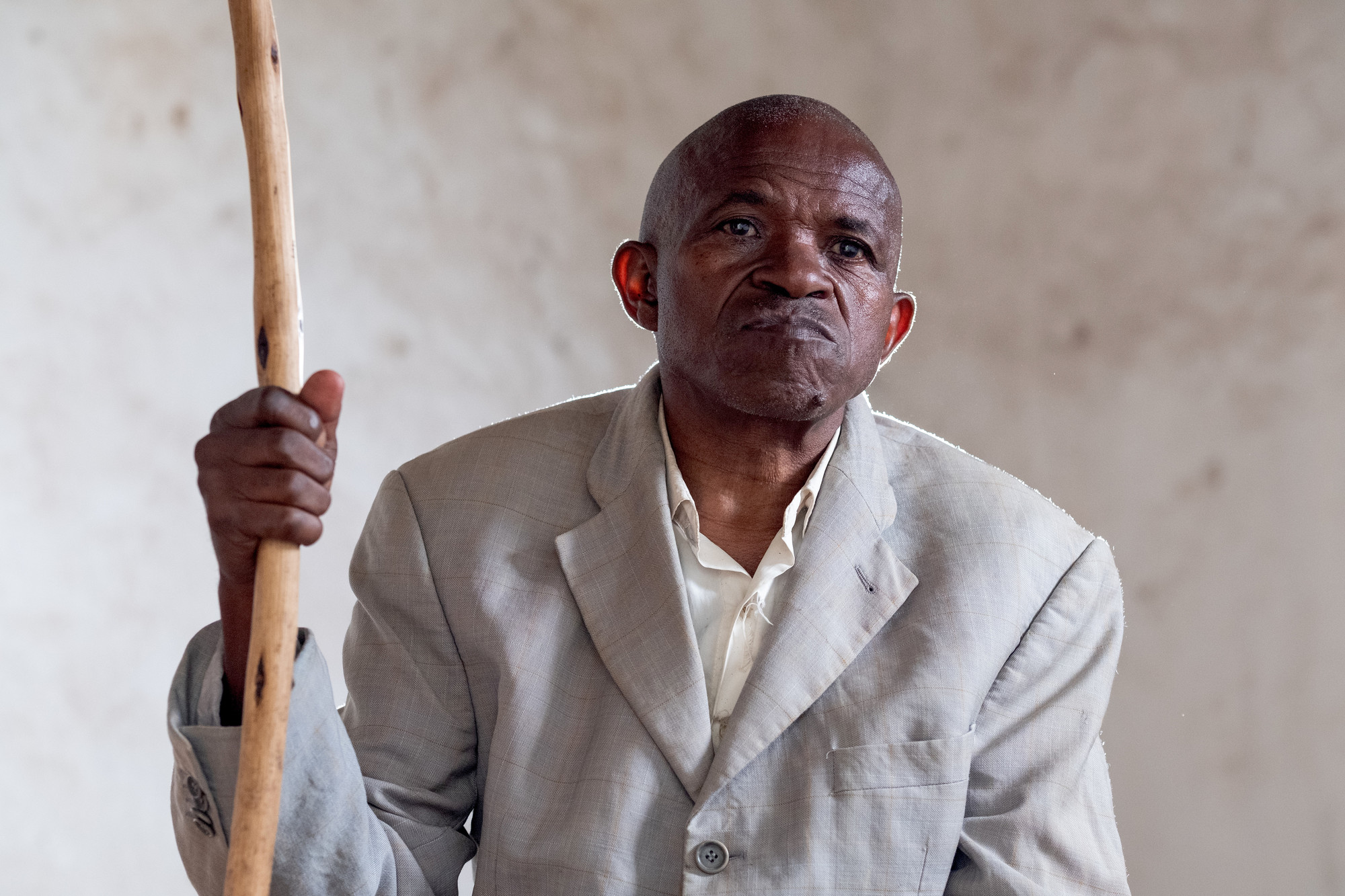
Losing his sight left him feeling sad and isolated. He told me, “I struggle to describe how I felt when I first went blind. I was really down and just wanted to die. But I learned at church that I have to wait for God’s plan, to find out what he can do for me.”
Jean-Baptiste used to tend his family’s farmland, look after their cows and go to a local market to buy and sell produce. But since losing his sight, he cannot leave his home. He relies on his wife and daughter to survive. They bring food and water to him – placing it beside him so he can find the bowl or jerry can.
He used to produce local beer made from bananas but now his wife, Thacienne, has to carry out all of the day-to-day activities as well as looking after him. This means their income has greatly reduced and they struggle to find enough food to feed the family.
Treatment out of reach

In August 2018, Jean-Baptiste decided to visit his nearest Health Centre. But, living in such a remote community, he faced a long and difficult journey to get there. He had to be carried on a stretcher by his neighbours up and down the steep hills – the same hills we had struggled to climb earlier that day.
After being stretchered down to the nearest village, Jean-Baptiste and Thacienne then had to ride on the back of motorcycles to the health centre – the cost of which they struggled to afford. They were then referred to the district hospital, but were greeted by further anguish there. Jean-Baptiste was told he had cataracts. And that they were not equipped to carry out the sight-saving surgery he needed to restore his sight.
Jean-Baptiste was told that the only place he could have cataract surgery is Kabgayi Eye Unit – a specialist eye hospital over 100km from his home. But he knew he would never be able to afford the cost of transport to get there – 18,000 Rwandan Francs (around £15), which is far beyond his family’s needs.
He feared that he would remain blind forever.
How you can help
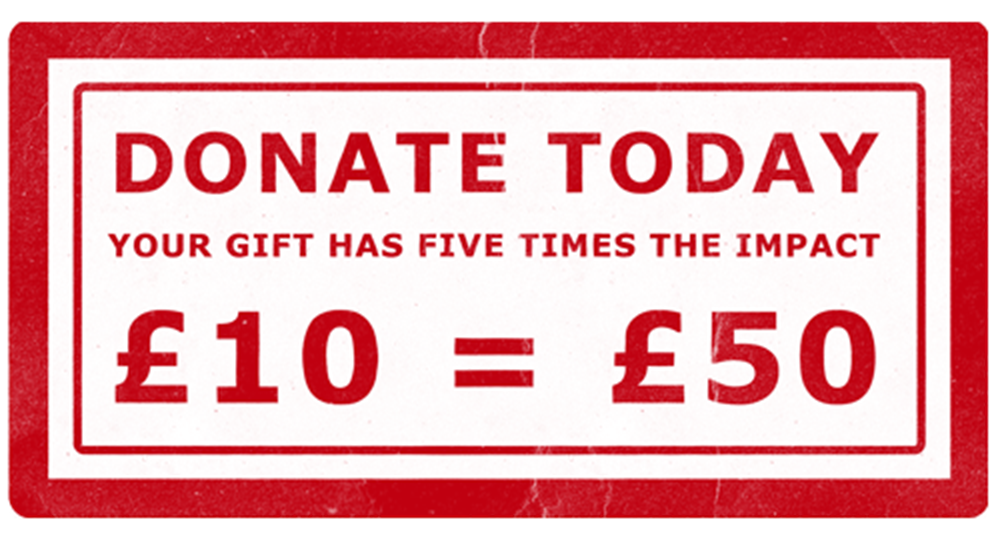 Jean-Baptiste’s story is not unusual. Many people living in poor, remote communities like him are needlessly blind because they simply cannot access eye health services. The lack of services in rural areas and the cost of both travel and treatment are huge barriers. But together, we can break down these barriers.
Jean-Baptiste’s story is not unusual. Many people living in poor, remote communities like him are needlessly blind because they simply cannot access eye health services. The lack of services in rural areas and the cost of both travel and treatment are huge barriers. But together, we can break down these barriers.
Did you know… until the 31st of December, every £1 you give will unlock additional funds and mean your gift has 5 times the impact!
Donations will support CBM’s work providing sight-saving treatment and support in some of the world’s poorest places. Find out more about out match funding appeal.
